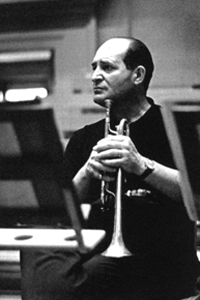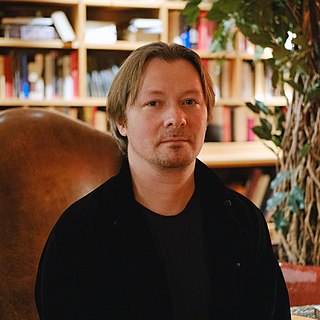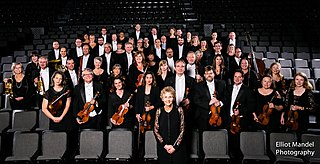
Tomaso Giovanni Albinoni was an Italian Baroque composer. His output includes operas, concertos, sonatas for one to six instruments, sinfonias, and solo cantatas. While famous in his day as an opera composer, he is known today for his instrumental music, especially his concertos. He is also remembered today for a work called "Adagio in G minor", attributed to him but said to be written by Remo Giazotto, a modern musicologist and composer, who was a cataloger of the works of Albinoni.
A concerto is, from the late Baroque era, mostly understood as an instrumental composition, written for one or more soloists accompanied by an orchestra or other ensemble. The typical three-movement structure, a slow movement preceded and followed by fast movements, became a standard from the early 18th century.

Trevor David Pinnock is a British harpsichordist and conductor.
A natural trumpet is a valveless brass instrument that is able to play the notes of the harmonic series.

Roger Louis Voisin was an American classical trumpeter. In 1959, The New York Times called him "one of the best-known trumpeters in this country."
Ulf Håkan Hardenberger is a Swedish trumpeter. Taking up the trumpet at the age of eight under the guidance of hometown teacher Bo Nilsson, Hardenberger pursued further studies at the Paris Conservatoire, with Pierre Thibaud, and in Los Angeles with Thomas Stevens. He has quickly established a career as a virtuoso who possesses not only an impressive command of the classical repertoire, but has also commissioned many new works from contemporary composers, including Harrison Birtwistle, Toru Takemitsu, Hans Werner Henze, Rolf Martinsson, Mark-Anthony Turnage, Heinz Karl Gruber, Benjamin Staern, Brett Dean, Tobias Broström and Arvo Pärt. Hardenberger has been called "the cleanest, subtlest trumpeter on earth" by The Times.

Alison Louise Balsom, Lady Mendes, is an English trumpet soloist, arranger, producer, and music educator. Balsom was awarded Artist of the Year at the 2013 Gramophone Awards and has won three Classic BRIT Awards and three German Echo Awards, and was a soloist at the BBC Last Night of the Proms in 2009. She was the artistic director of the 2019 Cheltenham Music Festival.

Sergei Mikhailovich Nakariakov is a Russian-Israeli virtuoso trumpeter residing in Paris, France, who came to prominence in the late 1990s. He released his first CD recording in 1992 at the age of 15.
Simon Andrew Thomas Standage is an English violinist and conductor best known for playing and conducting music of the baroque and classical eras on original instruments.
Rachel Podger is a British violinist and conductor specialising in the performance of Baroque music.
Han Samuel de Vries, is a Dutch oboist and is considered the doyen of the Dutch school of oboe playing.
Boston Baroque is the oldest period instrument orchestra in North America. It was founded in 1973 by the American harpsichordist and conductor, Martin Pearlman, to present concerts of the Baroque and Classical repertoire on period instruments, drawing on the insights of the historical performance movement.
Maurice Steger is a Swiss recorder player and conductor, mostly in Baroque music.
Michael Haydn's Trumpet Concerto in C major, MH 60, was completed in 1763, and "is one of the most difficult in the entire repertory." The work is in two movements:
A trumpet concerto is a concerto for solo trumpet and instrumental ensemble, customarily the orchestra. Such works have been written from the Baroque period, when the solo concerto form was first developed, up through the present day. Some major composers have contributed to the trumpet concerto repertoire, with the best known work being Joseph Haydn's Trumpet Concerto in E-flat.

Martin Pearlman is an American conductor, harpsichordist, composer, and early music specialist. He founded the first permanent Baroque orchestra in North America with Boston Baroque in 1973–74. Many of its original players went on to play in or direct other ensembles in what became a growing field in the American music scene. He later founded the chorus of that ensemble and has been the music director of Boston Baroque from its inception up to the present day.
La Petite Bande is a Belgium-based ensemble specialising in music of the Baroque and Classical era played on period instruments. They are particularly known for their recordings of works by Corelli, Rameau, Handel, Bach, Haydn, and Mozart.

Music of the Baroque is an American professional chorus and orchestra based in Chicago, Illinois.
Éric Aubier is a French classical concert trumpeter.
Helmut Branny is a German conductor, double bassist and professor of chamber music at the Hochschule für Musik Carl Maria von Weber Dresden. He is a member of the Sächsische Staatskapelle Dresden, musical director of the Dresdner Kapellsolisten and the Cappella Musica Dresden. With the Kapellsolisten, he has made many recordings, and toured internationally.







